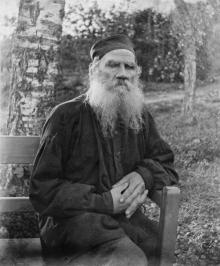- Home
- graf Leo Tolstoy
Anna Karenina Page 11
Anna Karenina Read online
Page 11
Chapter 11
Levin emptied his glass, and they were silent for a while.
"There's one other thing I ought to tell you. Do you know Vronsky?"Stepan Arkadyevitch asked Levin.
"No, I don't. Why do you ask?"
"Give us another bottle," Stepan Arkadyevitch directed the Tatar, whowas filling up their glasses and fidgeting round them just when he wasnot wanted.
"Why you ought to know Vronsky is that he's one of your rivals."
"Who's Vronsky?" said Levin, and his face was suddenly transformed fromthe look of childlike ecstasy which Oblonsky had just been admiring toan angry and unpleasant expression.
"Vronsky is one of the sons of Count Kirill Ivanovitch Vronsky, and oneof the finest specimens of the gilded youth of Petersburg. I made hisacquaintance in Tver when I was there on official business, and he camethere for the levy of recruits. Fearfully rich, handsome, greatconnections, an aide-de-camp, and with all that a very nice,good-natured fellow. But he's more than simply a good-natured fellow, asI've found out here--he's a cultivated man, too, and very intelligent;he's a man who'll make his mark."
Levin scowled and was dumb.
"Well, he turned up here soon after you'd gone, and as I can see, he'sover head and ears in love with Kitty, and you know that her mother..."
"Excuse me, but I know nothing," said Levin, frowning gloomily. Andimmediately he recollected his brother Nikolay and how hateful he was tohave been able to forget him.
"You wait a bit, wait a bit," said Stepan Arkadyevitch, smiling andtouching his hand. "I've told you what I know, and I repeat that in thisdelicate and tender matter, as far as one can conjecture, I believe thechances are in your favor."
Levin dropped back in his chair; his face was pale.
"But I would advise you to settle the thing as soon as may be," pursuedOblonsky, filling up his glass.
"No, thanks, I can't drink any more," said Levin, pushing away hisglass. "I shall be drunk.... Come, tell me how are you getting on?" hewent on, obviously anxious to change the conversation.
"One word more: in any case I advise you to settle the question soon.Tonight I don't advise you to speak," said Stepan Arkadyevitch. "Goround tomorrow morning, make an offer in due form, and God bless you..."
"Oh, do you still think of coming to me for some shooting? Come nextspring, do," said Levin.
Now his whole soul was full of remorse that he had begun thisconversation with Stepan Arkadyevitch. A feeling such as his wasprofaned by talk of the rivalry of some Petersburg officer, of thesuppositions and the counsels of Stepan Arkadyevitch.
Stepan Arkadyevitch smiled. He knew what was passing in Levin's soul.
"I'll come some day," he said. "But women, my boy, they're the pivoteverything turns upon. Things are in a bad way with me, very bad. Andit's all through women. Tell me frankly now," he pursued, picking up acigar and keeping one hand on his glass; "give me your advice."
"Why, what is it?"
"I'll tell you. Suppose you're married, you love your wife, but you'refascinated by another woman..."
"Excuse me, but I'm absolutely unable to comprehend how ... just as Ican't comprehend how I could now, after my dinner, go straight to abaker's shop and steal a roll."
Stepan Arkadyevitch's eyes sparkled more than usual.
"Why not? A roll will sometimes smell so good one can't resist it."
"Himmlisch ist's, wenn ich bezwungen Meine irdische Begier; Aber doch wenn's nich gelungen Hatt' ich auch recht huebsch Plaisir!"
As he said this, Stepan Arkadyevitch smiled subtly. Levin, too, couldnot help smiling.
"Yes, but joking apart," resumed Stepan Arkadyevitch, "you mustunderstand that the woman is a sweet, gentle loving creature, poor andlonely, and has sacrificed everything. Now, when the thing's done, don'tyou see, can one possibly cast her off? Even supposing one parts fromher, so as not to break up one's family life, still, can one helpfeeling for her, setting her on her feet, softening her lot?"
"Well, you must excuse me there. You know to me all women are dividedinto two classes ... at least no ... truer to say: there are women andthere are ... I've never seen exquisite fallen beings, and I never shallsee them, but such creatures as that painted Frenchwoman at the counterwith the ringlets are vermin to my mind, and all fallen women are thesame."
"But the Magdalen?"
"Ah, drop that! Christ would never have said those words if He had knownhow they would be abused. Of all the Gospel those words are the onlyones remembered. However, I'm not saying so much what I think, as what Ifeel. I have a loathing for fallen women. You're afraid of spiders, andI of these vermin. Most likely you've not made a study of spiders anddon't know their character; and so it is with me."
"It's very well for you to talk like that; it's very much like thatgentleman in Dickens who used to fling all difficult questions over hisright shoulder. But to deny the facts is no answer. What's to bedone--you tell me that, what's to be done? Your wife gets older, whileyou're full of life. Before you've time to look round, you feel that youcan't love your wife with love, however much you may esteem her. Andthen all at once love turns up, and you're done for, done for," StepanArkadyevitch said with weary despair.
Levin half smiled.
"Yes, you're done for," resumed Oblonsky. "But what's to be done?"
"Don't steal rolls."
Stepan Arkadyevitch laughed outright.
"Oh, moralist! But you must understand, there are two women; one insistsonly on her rights, and those rights are your love, which you can't giveher; and the other sacrifices everything for you and asks for nothing.What are you to do? How are you to act? There's a fearful tragedy init."
"If you care for my profession of faith as regards that, I'll tell youthat I don't believe there was any tragedy about it. And this is why. Tomy mind, love ... both the sorts of love, which you remember Platodefines in his Banquet, served as the test of men. Some men onlyunderstand one sort, and some only the other. And those who only knowthe non-platonic love have no need to talk of tragedy. In such lovethere can be no sort of tragedy. 'I'm much obliged for thegratification, my humble respects'--that's all the tragedy. And inplatonic love there can be no tragedy, because in that love all is clearand pure, because..."
At that instant Levin recollected his own sins and the inner conflict hehad lived through. And he added unexpectedly:
"But perhaps you are right. Very likely ... I don't know, I don't know."
"It's this, don't you see," said Stepan Arkadyevitch, "you're very muchall of a piece. That's your strong point and your failing. You have acharacter that's all of a piece, and you want the whole of life to be ofa piece too--but that's not how it is. You despise public official workbecause you want the reality to be invariably corresponding all thewhile with the aim--and that's not how it is. You want a man's work,too, always to have a defined aim, and love and family life always to beundivided--and that's not how it is. All the variety, all the charm, allthe beauty of life is made up of light and shadow."
Levin sighed and made no reply. He was thinking of his own affairs, anddid not hear Oblonsky.
And suddenly both of them felt that though they were friends, thoughthey had been dining and drinking together, which should have drawn themcloser, yet each was thinking only of his own affairs, and they hadnothing to do with one another. Oblonsky had more than once experiencedthis extreme sense of aloofness, instead of intimacy, coming on afterdinner, and he knew what to do in such cases.
"Bill!" he called, and he went into the next room where he promptly cameacross an aide-de-camp of his acquaintance and dropped into conversationwith him about an actress and her protector. And at once in theconversation with the aide-de-camp Oblonsky had a sense of relaxationand relief after the conversation with Levin, which always put him totoo great a mental and spiritual strain.
When the Tatar appeared with a bill for twenty-six roubles and oddkopecks, besides a tip for himself, Levin, who would another time havebeen horrified,
like any one from the country, at his share of fourteenroubles, did not notice it, paid, and set off homewards to dress and goto the Shtcherbatskys' there to decide his fate.

 Anna Karenina
Anna Karenina Sevastopol
Sevastopol The Cossacks: A Tale of 1852
The Cossacks: A Tale of 1852 The Kingdom of God Is Within You
The Kingdom of God Is Within You